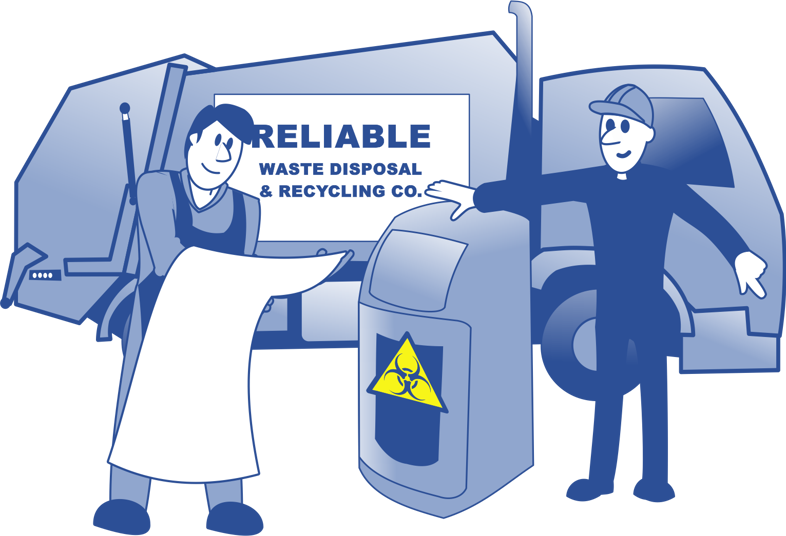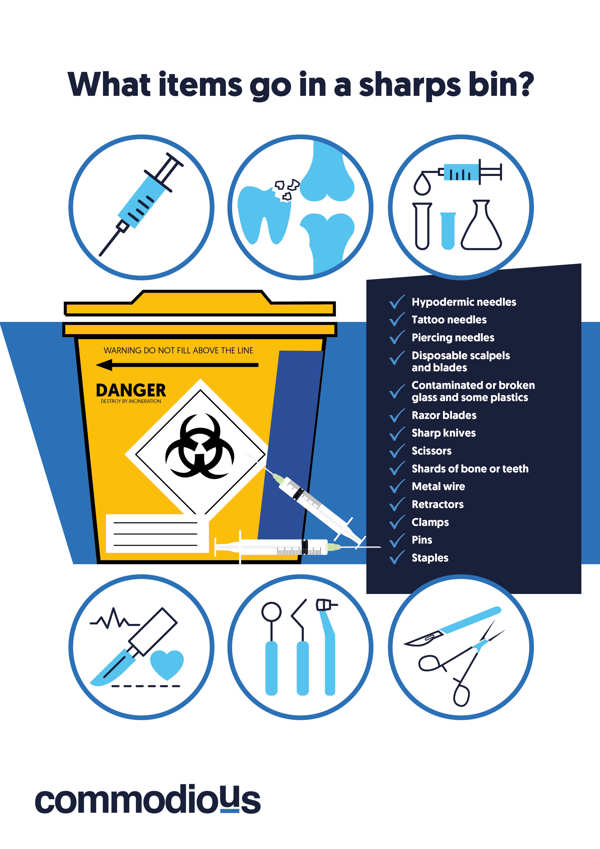
Sharps, such as needles and syringes, are commonly used in healthcare settings or for personal use at home. However, improper disposal of these items can threaten public health and safety.
In this blog, we will cover all the aspects of safe sharps disposal for businesses, home injections, and healthcare. We will also discuss the different types of sharps and the risks involved in incorrect disposal.
Keep reading to learn best practices for safe sharps disposal, including tips on preventing and handling sharps injuries. You'll also learn about approved disposal techniques for different types of sharps and regulatory compliance around safe sharps disposal at home and work.
Lastly, we will share some useful resources and tools for proper sharps disposal to ensure you have everything you need to dispose of your sharps safely.
Safety is key when using and disposing of sharps for businesses, home injections, and healthcare. Keeping safe practices in focus helps:
Sharps, such as needles, syringes, and lancets, pose potential health risks if not disposed of properly.
Let’s look at the different types of sharps and the risks involved with improper disposal.
Sharps are objects that can puncture or cut the skin. These include:
Correct sharps disposal is crucial to preventing injuries and the transmission of diseases. Sharps may carry bloodborne diseases, like HIV and Hepatitis B and C. Incorrectly disposed sharps at work pose a high risk to cleaning, maintenance, facility staff, and the general public. At home, unsafe sharps disposal can harm anyone close by, including children and pets.
Proper sharps disposal is crucial for public health and safety.
Training employees on sharps waste management and providing designated containers is important for businesses and healthcare workers. Individuals who use sharps at home, such as diabetes patients, should explore safe disposal options. Dedicated sharps disposal is often available at a pharmacy. The NHS and other healthcare providers often guide sharps users through safe disposal services.
Healthcare facilities and businesses must adhere to regulations and guidelines when disposing of hazardous waste. The Health and Safety Executive has produced an information sheet for employers and employees to help comply with the Health and Safety (Sharp Instruments in Healthcare) Regulations 2013.
To prevent sharps injuries, always follow the following guidance.
If you have an accidental sharps injury, acting quickly and taking the necessary precautions is essential.
When it comes to sharps disposal, it is crucial to follow correct methods and techniques. One of the most important steps is using a sharps container to safely dispose of needles, syringes, and other sharp instruments. A sharps container is puncture-resistant and should be labelled "Sharps".
If you cannot access a specialised sharps bin or sharps bin disposal, avoid using a general rubbish bin or recycling bin. Some sharps manufacturers offer a mail-back program. Or you can find a designated sharps disposal location for safe disposal. Your local government website should provide an up-to-date list of these facilities or you can ask your pharmacist for advice.

Download a printable copy of the above for your own health and safety display here.
When disposing of different sharps, follow approved techniques to ensure safety.
When disposing of syringes, needles and scalpels, use a sharps container with a tight-fitting lid labelled with biohazard warning symbols. The same guidelines apply to lancets and blood glucose monitoring devices.
There is different guidance for razors and blades, as these are not designed to puncture the skin. Wrap razors and blades in a puncture-resistant container before disposing them for general waste collection or recycling centres. When it comes to sharp glass or plastic tubes, wrap them in paper or use a puncture-resistant container before disposal.
Individuals have a duty of care to safely dispose of sharps in their homes, while employers must provide proper disposal options in the workplace. Professionals using sharps in healthcare facilities and in people's own homes also have legal obligations to ensure safe sharps disposal.
Sharps disposal bins must meet regulatory standards. They should have secure lids to prevent injuries and look for leak-proof options for safe handling and transport. Additionally, consider containers that are easily accessible for convenient disposal and have clear labelling for easy identification. These measures ensure the safe disposal of sharps in both home and workplace settings.
We have rounded up some resources and tools for dealing with sharps. The information is mainly for those working in the healthcare industry. However, anyone dealing with sharps disposal will benefit from raising their awareness.
Safe sharps disposal is critical for businesses, home injections, and healthcare settings. It protects individuals from injuries and the risk of infection and ensures the safety of the environment and community.
You can significantly reduce the risk by following best practices and knowing the steps to take in case of accidental injury. Compliance with regulatory requirements and using approved disposal techniques and containers enhance safety measures.